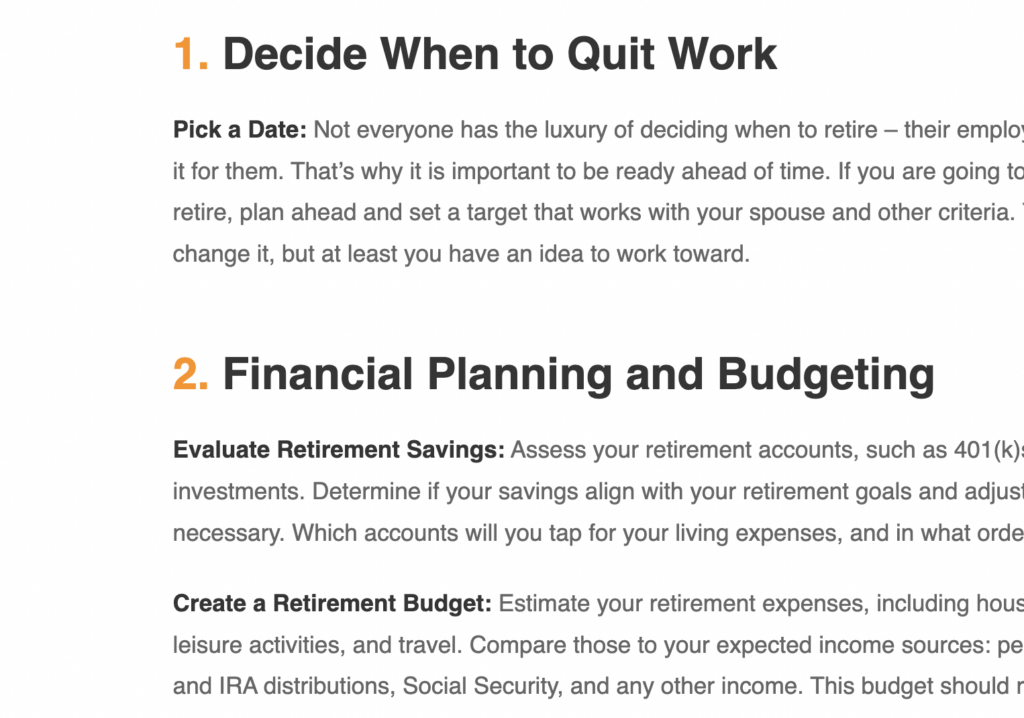The Last Decade: 7 Crucial Actions for a Smooth Transition to Retirement
Category: Retirement Planning
May 29, 2024 – The decade leading up to retirement is crucial for laying the groundwork for a secure and fulfilling retirement. The steps you take in this phase are more important and more complex than you might realize, so spending time and effort now will have have a big payoff in the future.
1. Decide When to Quit Work
Pick a Date: Not everyone has the luxury of deciding when to retire – their employer or health does it for them. That’s why it is important to be ready ahead of time. If you are going to retire, or partially retire, plan ahead and set a target that works with your spouse and other criteria. You can always change it, but at least you have an idea to work toward.
2. Financial Planning and Budgeting
Evaluate Retirement Savings: Assess your retirement accounts, such as 401(k)s, IRAs, and other investments. Determine if your savings align with your retirement goals and adjust contributions if necessary. Which accounts will you tap for your living expenses, and in what order?
Create a Retirement Budget: Estimate your retirement expenses, including housing, healthcare, leisure activities, and travel. Compare those to your expected income sources: pensions, 401(k) and IRA distributions, Social Security, and any other income. This budget should reflect any changes in lifestyle and spending habits?. Although you might spend less once you are retired, travel and medical expenses could actually mean your expenses are higher.
Debt Management: Aim to pay off high-interest debts and consider strategies for managing or eliminating mortgage debt. Reducing debt now can significantly ease financial pressure in retirement.

3. Healthcare Considerations
Understand Medicare Options: Research Medicare plans and supplemental insurance to ensure you have adequate healthcare coverage. It’s essential to understand the costs and benefits of different plans, and when to apply. Medicare has many complicated options including Medicare Parts A, B, C, and D. Medicare Advantage plans have many benefits and often zero premiums, but you have to evaluate if they are right for your situation vs. traditional Medicare and Medigap plans. See “5 Medicare Mistakes You Don’t Want to Make“. Taking Part D (prescription drug coverage) at age 65 is critical, because there are penalties for every month you delay.
Long-term Care Insurance: Consider purchasing long-term care insurance to cover potential future healthcare needs, such as nursing home or in-home care, which can be expensive without coverage. Some people with higher assets choose self-insurance.
4. Social Security and Pension Decisions
Optimize Social Security Benefits: Decide the best time to start collecting Social Security. Delaying benefits can result in higher monthly payments, but personal circumstances may warrant an earlier start. You can claim at age 62, but if you wait until age 70 your benefit will almost double. It will increase 8% per year if you wait from your Full Retirement Age (67) to age 70. Factors to consider are your life expectancy (and of your spouse who will get your benefit if you die first and your benefit is higher), and how much you need the money until you can claim.
Pension Options: If you have a pension, review your payout options. Consider whether a lump sum or monthly payments better fits your financial plan and lifestyle. Sometimes an annuity is a good choice. If offered a buyout, consult with your financial advisor before making a decision.
5. Lifestyle and Relocation
Where to Live: Decide whether to downsize, relocate, or modify your current home. Consider the cost of living, proximity to family, healthcare facilities, and recreational opportunities in your decision?. Most people want to continue living in their same homes, but that often comes at an economic, social, and lifestyle cost. Now is when you should be discussing priorities with your partner, spouse, or family members. Armed with that knowledge, this is the time to start scouting out various places to live – near and far. There are so many options – 55+ communities, active adult communities, condos, traditional neighborhoods, etc. – it is worth it to explore the ones that interest you.
Think About Hobbies and Social Activities: Plan for how you will spend your time. Engaging in hobbies, volunteering, or part-time work can provide a sense of purpose and help maintain social connections?. If you haven’t got a hobby or activity out of work activity, start testing the waters to see what you would like.
6. Estate Planning
Update Legal Documents: Ensure your will, power of attorney, and healthcare directives are up to date. If you don’t have these, consult an attorney and get them ready. Clearly outline your wishes to avoid potential legal issues and ensure your assets are distributed according to your preferences?.
Consider a Trust: Depending on your financial situation, a trust might be beneficial for managing your estate and providing for your heirs in a tax-efficient manner?.
7. Tax Planning
Develop the best tax strategies: Now is the time to think about the taxation of your retirement income. For example, if you high IRA and 401(k) balances it might be a good idea to convert them to Roth accounts, because withdrawals from them are not taxable. You must start taking RMDs by April 1 of the year after you turn 73. That will change to age 75 starting in 2033. The timing of any conversion is critical, since you will pay taxes on the amount converted. That can be a good reason to delay Social Security, so as to move the money into a Roth in lower income years. These are good discussions to have with your tax professional or financial advisor.
Conclusion
The decade before retirement is a time for careful planning and decision-making. By addressing these key areas—financial planning, healthcare, Social Security, lifestyle choices, estate planning, and tax strategies—you can pave the way for a secure and enjoyable retirement. Taking proactive steps now will help ensure you are well-prepared for the next chapter of your life.
For further reading:
See Topretirements’ Retirement 101 Course (10 Modules on every important topic)
Comments: What are you doing about your retirement planning as that date approaches? What are your concerns and successes? Please share in the Comments section below.







Comments on "The Last Decade: 7 Crucial Actions for a Smooth Transition to Retirement"
Admin says:
I will echo the point about Roth IRA/401(k)s. If you have substantial balances in non Roth retirement funds, looking for an opportunity to convert some of that to Roths can be a very good idea, before you have to start taking hefty RMDs.